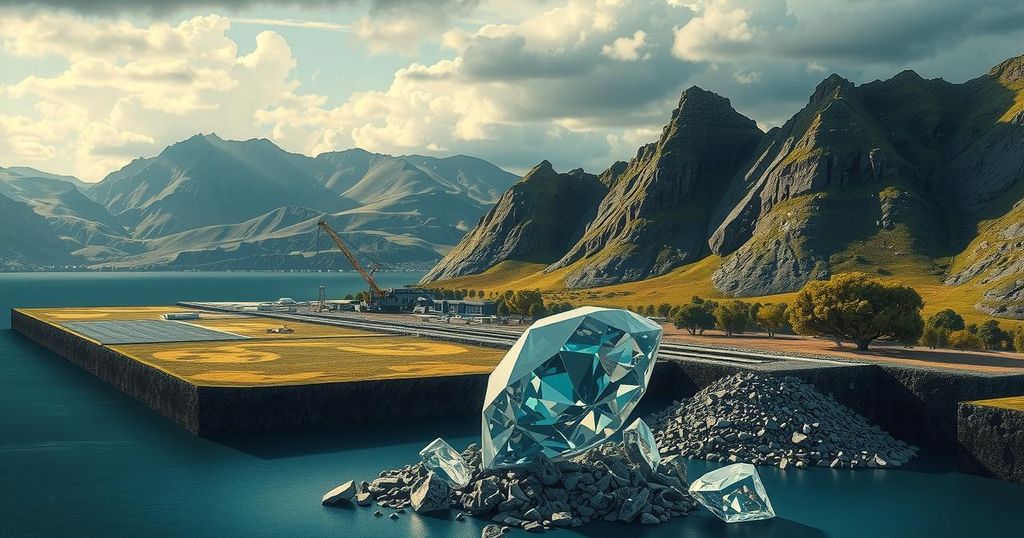The Democratic Republic of Congo is rich in natural resources yet affected by persistent conflict and humanitarian crises. The resurgence of the M23 rebel group raises allegations of Rwandan involvement, highlighting power dynamics and resource exploitation issues. International collaboration is crucial to support the Congolese populace amidst the ongoing turmoil through awareness, financial aid, and advocacy for policy reform.
The Democratic Republic of Congo (DRC), renowned for its extensive natural resources, is currently facing severe conflict. The nation, despite possessing vast mineral wealth and agricultural potential, experiences unprecedented violence, particularly in the eastern regions. This analysis delves into the ongoing conflict, explores allegations of Rwandan involvement, and discusses viable strategies for humanitarian assistance to the DRC during this crisis.
Endowed with approximately $24 trillion in natural resources, including significant reserves of cobalt and coltan, the DRC is characterized by its rich potential. However, this wealth coexists with persistent conflict, recently intensified by the resurgence of the March 23 Movement (M23) rebel group. This conflict can be traced back to the aftermath of the Rwandan genocide in 1994, which significantly impacted the DRC’s ethnic landscape and contributed to ongoing tensions between Hutu and Tutsi groups.
Rwanda, under President Paul Kagame, has been accused of providing support to the M23 rebels, though the Rwandan government denies these allegations. However, international observers have cited evidence pointing to Rwandan military assistance, including arms and training for M23 fighters. This conflict reflects regional power dynamics rather than just local animosities and grievances.
The involvement of Rwanda in the DRC is multifaceted, driven by both security concerns regarding Hutu militias and the strategic desire to control lucrative mineral resources. M23 claims to protect the Tutsi population from discrimination, but this rationale is often perceived as a cover for resource exploitation, as they occupy key mining territories rich in valuable minerals like coltan and gold.
The humanitarian consequences of this ongoing conflict are dire, with reports of severe human rights violations, including the use of child soldiers and massacres. The violence perpetuates a cycle of exploitation of the DRC’s natural resources and exacerbates the humanitarian crisis.
Addressing the humanitarian needs of approximately 26 million Congolese individuals in crisis is crucial. Increased international support is imperative, considering the rising numbers of internally displaced persons due to persistent violence.
There are several avenues through which individuals and organizations can assist the DRC. Raising awareness of the humanitarian issues facing the Congolese is essential for mobilizing support for affected communities. Financial contributions to reputable humanitarian organizations, such as the International Rescue Committee and Médecins Sans Frontières, play a critical role in providing necessary aid.
Advocacy for ethical sourcing practices in international mineral trade is also vital in pressuring governments and businesses to ensure accountability. Furthermore, diplomatic negotiations must be encouraged to seek a resolution to the conflict without external interference.
The DRC symbolizes the paradox of a resource-rich nation ensnared in violence and humanitarian crises. With alleged Rwandan motivations rooted in both security and resource control, the Congolese populace bears the brunt of this struggle. Collective global actions emphasizing awareness, funding, and advocacy can significantly support the DRC, paving the way for a peaceful future where its wealth benefits its people and resolve conflicts effectively.
The Democratic Republic of Congo is among the richest countries in terms of natural resources, yet it grapples with severe internal conflict and humanitarian crises. The ongoing war, fueled by the resurgence of the M23 rebel group, adds layers of complexity wherein regional dynamics, notably the role of Rwanda, exacerbate tensions and violence. Understanding this backdrop is imperative to grasp the central issues affecting millions in the DRC, highlighting the urgent need for robust humanitarian intervention and support.
In conclusion, the Democratic Republic of Congo faces a grave humanitarian crisis, exacerbated by ongoing conflict and foreign involvement, particularly from Rwanda. Immediate action is needed from the international community to alleviate suffering through awareness, financial support, and advocacy for ethical policies. The potential for prosperity in the DRC lies in restoring peace and ensuring its vast resources enrich the lives of its own citizens rather than fuelling further conflict.
Original Source: borkena.com






